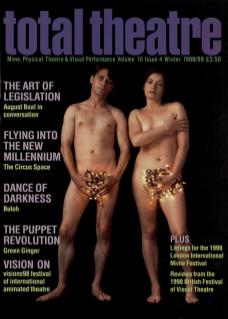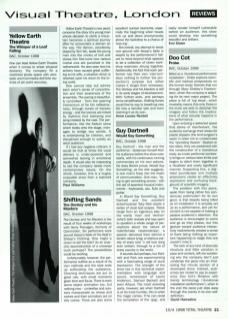Billed as a 'durational performance installation’, Probe explores scientific and medical perspectives on the human body: themes that run through Mary Shelley's Frankenstein, which the company is adapting for its next major project. The piece is full of 'big ideas', which invariably means that only those in the know are able to decipher the imagery and follow the implications of what actually happens in the performance.
Upon entering a darkened space that stinks of disinfectant, the audience exchange their shoes for plastic slippers (the kind surgeons wear) in order not to contaminate ‘the operating theatre'. Seated on two sides, they are presented with the construction of a monstrous body, as a solo performer sombrely brings on various latex limbs and begins to stitch them together in a ritualised and overly significant manner. Supporting this, a digitised soundscape and multiple projections create an effectively oppressive and confusing background of scientific imagery.
The problem with this piece, aside from being rather too ponderously postmodern for its own good, is that despite being billed as an installation it is actually set up as a performance, and yet its content is not capable of holding a passive audience's attention. The audience is encouraged to come and go as they please, but this gesture toward audience interactivity inadvertently creates a sense of there being nothing so important happening on stage that one couldn't miss it.
The lack of any kind of dramatic structure and little variation in pace and content, left me wondering why the company don't just condense the piece into an interesting five-minute section of a developed show. Instead, audiences are invited to pay to experience Doo-Cot's flirtation with trendy terminology (‘durational installation performance’), when in the end the piece just slips away through the cracks in its own self-definition.

